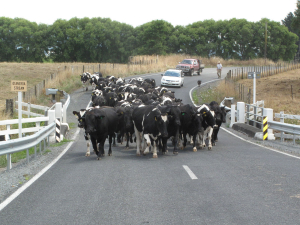Green no more?
OPINION: Your old mate has long dismissed the Greens as wooden bicycle enthusiasts with their heads in the clouds, but it looks like the ‘new Greens’ may actually be hard-nosed pragmatists when it comes to following voters.
 Total demand of New Zealand's consenting system from all sectors is projected to increase by over 40% by 2050.
Total demand of New Zealand's consenting system from all sectors is projected to increase by over 40% by 2050.
A 50% improvement in resource consent processing times could be necessary for New Zealand to meet its 2050 emissions targets.
That’s according to new research commissioned by Te Waihanga, the New Zealand Infrastructure Commission and developed by Sapere Research Group.
The Infrastructure Consenting for Climate Targets report looks at how much energy and transport infrastructure the country requires to support the transition to a low emissions economy.
Researchers modelled how long it would take to process the necessary consents under the Resource Management Act (RMA) and what it might cost if New Zealand failed to develop the necessary infrastructure.
The report states that total demand on New Zealand’s consenting system from all sectors is projected to increase by over 40% by 2050.
The researchers found that trends in consenting processes indicated that the ability of the consenting system to deliver on the infrastructure required to meet national climate targets is under threat.
“Consenting a project, particularly a complex infrastructure project, is becoming more costly, takes longer to complete and requires more resources,” the report reads.
“New Zealand is on track to miss between 11 – 15% of the emission reductions required from the energy and transport sectors by 2050 due to consenting delays… As a result of consenting delays in these scenarios, New Zealand is on track to incur an emissions liability of between $5 billion and $7 billion by 2050.”
Te Waihanga chief executive Ross Copland says that in an earlier study of consenting costs, Sapere Research Group had identified that since 2014/15 consent times have blown out by 150%.
“Everyone agreed that was a worrying trend but until now we could only speculate on what the implications of longer consenting times would be,” Copland says.
He says the report only reinforces the need to reverse increasing consent processing times if the country wants to meet its Net Zero 2050 commitment.
“Slow or uncertain consenting times heighten the risks face by infrastructure providers through higher project financing costs, delays in awarding contracts or the procurement of critical materials with long lead times,” Copland says.
He adds that those slow or uncertain consenting times can also act as a barrier to new market entrants looking to invest and reduce infrastructure pipeline certainty.
“These issues have significant implications for our environment goals,” he says. “If we can’t reverse this trend of slower and more complex consenting, New Zealand simply won’t be able to build the energy, transport and other infrastructure we need to achieve our 2050 emissions target.”
Agrisea NZ has appointed Craig Hudson as it's new chief growth officer.
State farmer Landcorp, trading as Pamu, is a forecasting a full-year net profit of around $100 million.
Tony Aitken, chief executive of Ruralco, has been awarded the Excellence in Business Leadership Award at the ANZ Business of the Year Awards.
Global trade has been thrown into another bout of uncertainty following the overnight ruling by US Supreme Court, striking down President Donald Trump's decision to impose additional tariffs on trading partners.
Controls on the movement of fruit and vegetables in the Auckland suburb of Mt Roskill have been lifted.
Fonterra farmer shareholders and unit holders are in line for another payment in April.

OPINION: Here w go: the election date is set for November 7 and the politicians are out of the gate…
OPINION: ECan data was released a few days ago showing Canterbury farmers have made “giant strides on environmental performance”.